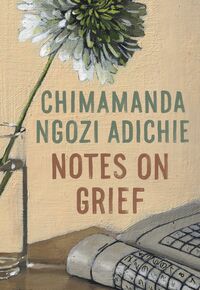You need to sign in or sign up before continuing.
Take a photo of a barcode or cover
First, after listening to this narrated by Adichie herself, I feel like I could listen to her read grocery lists and be content. She just has such a peaceful, beautiful tone. Second, this book is so intense, raw, and honest in its retelling of Adichie’s father’s death and her overwhelming grief that followed. While the anecdotes about her father are personal, the feelings she shares are so universal and eloquently stated. This is certainly not an easy read, but it is a quick, powerful, memorable one.
“I am writing about my father in the past tense, and I cannot believe I am writing about my father in the past tense.”
El corazón arrugado
Por primera vez en mi vida leo a alguien que amaba tanto a su padre como yo siento que amo al mío, sólo leer esto me ha hecho sentir el dolor de semejante letra. Difícilmente sacaré la sencillez de este libro de mi corazón.
Por primera vez en mi vida leo a alguien que amaba tanto a su padre como yo siento que amo al mío, sólo leer esto me ha hecho sentir el dolor de semejante letra. Difícilmente sacaré la sencillez de este libro de mi corazón.
Does Chimamanda Ngozi Adichie live in my head? I think she might.
“Enemies beware: the worst has happened. My father is gone. My madness will now bear itself.”
“The layers of loss make life feel papery thin.”
“Enemies beware: the worst has happened. My father is gone. My madness will now bear itself.”
“The layers of loss make life feel papery thin.”
emotional
emotional
inspiring
sad
fast-paced
Beautiful prose. But if you're looking for guidance on how to handle your own grief you won't find it. This is more about Adichie's own experience with grief and also gives us a glimpse of funeral practices in Nigeria.
Grief is a cruel kind of education. You learn how ungentle mourning can be, how full of anger. You learn how glib condolences can feel. You learn how much grief is about language, the failure of language and the grasping for language.Chimamanda Ngozi Adichie's novella celebrates her father's life through ruminating over the rupturous grief she has felt after his unexpected passing. I think this is also the first publication I've read so far that addresses the pandemic, since it complicated the process of grieving (Adichie was unable to travel to Nigeria and assist her family hands-on during the funeral proceedings). It's short, and poignant in a similar way to Adichie's other works, and it feels like a deeply personal journal account that helps her process the tragedy. Recommend for people who have lost loved ones, now more so?
Very personal exploration of the grief she experienced for her father and reminiscing about him. Some really hard-hitting moments.
I appreciate the author sharing her journey with her father’s death. Though I was hoping/expecting for some more broad thoughts on grief and dealing with it.




